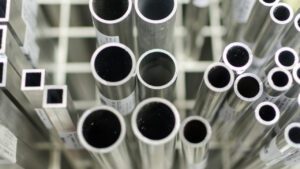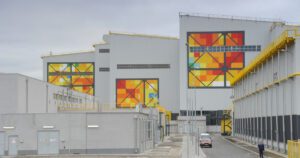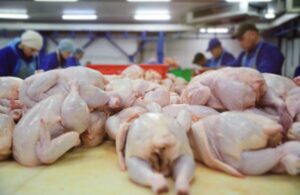
PJSC “Interpipe Dnepropetrovsk Vtormet” (Dnipro), which is part of the pipe and wheel company (TKK) “Interpipe”, ended January-September of this year with a net loss of UAH 54.081 million against a net profit of UAH 17.197 million for the same period last year.
According to the interim report of the company, published in the information disclosure system of the National Securities and Stock Market Commission (NSMSC), for 9 months-2022, the company’s net income decreased by 44%, to UAH 2 billion 502.603 million.
Retained earnings by the end of September 2022 amounted to UAH 125.783 million.
The enterprise processed 122.675 thousand tons of scrap metal during the specified period.
As reported, following the results of work in 2021, the company increased its net profit by 75%, to UAH 14.234 million, net income increased 2.2 times, to UAH 6 billion 796.291 million. At the same time, 9.706 thousand tons of scrap metal was procured, services were provided for the processing and reloading of customer-supplied raw materials in the amount of 677.651 thousand tons.
“Interpipe Dnepropetrovsk Vtormet” specializes in the procurement and processing of ferrous scrap in the Dnepropetrovsk region with the subsequent sale of this product, including the preparation of charge for steelmaking enterprises.
According to the company, at the end of 2021, Interpipe Limited (Cyprus) owns 98.6699% of the shares of PJSC Interpipe Dnepropetrovsk Vtormet.
The authorized capital of the company is UAH 64.876 million.

PrJSC “Ukrainian Graphite” (“Ukrgrafit”, Zaporizhia) following the results of work in 2021, increased its net loss by 2.2 times compared to the previous year – up to UAH 317.514 million from UAH 144.408 million.
According to the information on the agenda of the annual meeting of shareholders scheduled for November 30 of this year, which will be held remotely, the undistributed profit of the enterprise at the end of last year amounted to UAH 3 billion 527.125 million.
At the meeting, the shareholders intend to hear the report of the directorate on the work in 2021, approve it and decide on covering losses from the retained earnings received by the plant in 2018.
The shareholders will also terminate the powers of the members of the supervisory board and elect a new one.
In addition, the meeting will determine the main directions of the company’s activities in 2022-2024, including the modernization of the roasting and graphitization divisions.
“Ukrgrafit” is a leading Ukrainian manufacturer of graphite electrodes for electric steel-smelting, ore-thermal and other types of electric furnaces, commercial carbon masses for Soederberg electrodes, carbon-based lining materials for metallurgical, machine-building, chemical and other industrial complexes.
According to the National Depository of Ukraine (NDU) for the fourth quarter of 2021, Intergraphite Holdings Company Limited (Bermuda) owns 23.9841% of PJSC, C6 Safe Group Limited (Cyprus) owns 72.0394%.
The authorized capital of PrJSC is UAH 233.959 million, the nominal value of 1 share is UAH 3.35.

PJSC Interpipe Nyzhniodniprovsky Pipe Rolling Plant (NTZ, Dnipro) in January-June of this year posted a net loss of UAH 882.682 million against a net profit of UAH 163.581 million for the same period last year.
According to the interim report of the company, net income for this period decreased by 42.8% – to UAH 4.176 billion.
Retained earnings by the end of June 2022 amounted to UAH 2.951 billion.
In turn, the consolidated loss of Interpipe NTZ for January-June 2022 amounted to UAH 882.732 million (there was a profit of UAH 163.481 million).
According to the annual report for 2021, the company’s net loss amounted to UAH 486.412 million against a net profit of UAH 22.905 million for 2020. Income for 2021 amounted to UAH 8.226 billion (for 2020 – UAH 9.470 billion).
The group also published a report for January-March 2022, according to which the loss amounted to UAH 783.259 million, net income – UAH 1.075 billion.

Lifecell LLC mobile operator in April-June 2022 recorded a net loss of UAH 27.4 million compared to a net profit of UAH 116 million for the same period in 2021 due to write-offs of assets in the territories controlled by Ukraine, but not working for more than 92 days, and assets in the territories seized by Russia.
According to the parent company Turkcell, the company’s income in the second quarter of this year increased by 5.4% – to UAH 2.127 billion from UAH 2.018 billion in the second quarter of 2021, mainly due to an increase in income from international incoming calls and data transfer.
In the specified period, EBITDA increased by 8.8% – up to UAH 1.231 billion, and EBITDA margin increased by 1.8 percentage points – up to 57.9%, which the company explained with cost control measures implemented by Lifecell.
The report clarifies that the write-offs amounted to 204 million Turkish lire (about UAH 383.1 million at the rate in the report).
Lifecell’s capital investments in the second quarter of this year decreased by a third compared to the second quarter of the previous year, to UAH 659 million.
The active Lifecell subscriber base for the three reporting months decreased by 5.6%, or 500,000 – to 8.4 million subscribers, returning to the level of a year ago.
Active three-month ARPU in the second quarter of this year decreased by 1.8% compared to the previous quarter – to UAH 82.8, and MoU – by 5.5%, to 160.7 minutes. In annual terms, ARPU increased by 1.1%, while MoU fell by 14%.
“Meanwhile, three-month active 4.5G users grew by 7% year-on-year in the second quarter of 2022, to 76% of the total number of mobile data users. Lifecell maintained its leadership in the Ukrainian market in terms of smartphone penetration, which at the end of Q2 2022 reached 84.6%,” the company says.

The net loss of Ukrainian banks in January-May 2022 amounted to UAH 1.3 billion against a profit of UAH 23.8 billion for the same period last year, the press service of the National Bank of Ukraine (NBU) reported on Tuesday.
It is indicated that the net profit for May of this year amounted to UAH 6.1 billion, while in April there was a net loss of UAH 7.426 billion.
According to the NBU, the income of banks for 5 months increased by 15% compared to the same period last year – up to UAH 116.5 billion, including interest income – by 18%, to UAH 76.957 billion, while the commission decreased by 8.9 % – up to UAH 31.032 billion.
At the same time, bank expenses in January-May increased by 51% – up to UAH 117.8 billion, including interest expenses – by 4.3%, up to UAH 22.135 billion, commission expenses – by 13.914%, up to UAH 8.4 billion and expenses from deductions to reserves – by 8.2 times, up to UAH 39.2 billion.

Agroholding MHP, the largest chicken producer in Ukraine, in the first quarter of 2022 received a net loss of $122 million against $1 million of net profit in January-March 2021, and its EBITDA fell by 16% to $53 million, according to the group’s report on the London Stock Exchange on Friday.
“Since February 24, 2022, the group has suffered losses due to the war in Ukraine following the Russian invasion. War-related expenses for the first three months of 2022 amounted to $25 million, of which 53% were donations to support the community, write-offs of reserves and biological assets – 33%, other expenses related to the war – 14%,” the report of the agrarian group says.
According to the agricultural holding, most of the net loss received in the first quarter of this year was due to changes in the exchange rate. The loss from the operating activities of the group of companies in January-March amounted to $27 million, while the loss on the exchange rate was $95 million.
MHP’s revenue for the reporting period increased by 24% compared to January-March 2021 to $553 million, its growth was driven by strong operating and financial performance in the pre-war period in January and February 2022, the document says.
In addition, it is indicated that the board of directors of MHP decided not to pay dividends for 2021 due to the uncertainty in Ukraine and the resulting need to save cash to support its activities.Gross profit of the group of companies in the first quarter of this year amounted to $92 million (+39% compared to January-March 2021), and operating profit – $12 million (-25%). Gross margin for the period was 17% (+2 p.p.), operating margin – 2% (-2 p.p.), and return on sales (EBITDA margin) -53% (-10 p.p.).